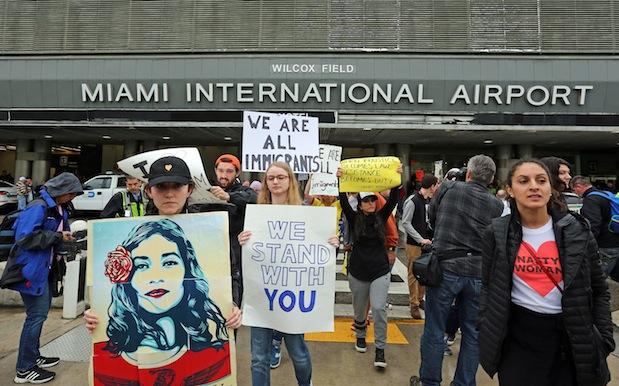
After all, only the biggest pessimists among us would have thought he’d pull something so decisively flawed in his first few days as POTUS. Nobody – not even America’s own border security administrations – was prepared for this.
Simply put, the ban impacts citizens of the seven nations listed in Trump’s executive order – Iran, Iraq, Libya, Somalia, Sudan, Syria, and Yemen. This ban will last for at least 90 days, starting from the Saturday just passed.
Here’s what the ban means for others looking to travel to the US in the next three months.
As simply as possible, if you are not a citizen of one of these nations, you will not be directly affected by the ban in any direct way.
Upon arrival, you will not be subject to any checks, interviews, or any other procedures that weren’t present when Trump signed the order. You may, however, be held up due to the ongoing protests at many of the nation’s major airports – and staff on-site who may be sick of dealing with this enormous clusterfuck of a ruling.
Bradley airport protest right now #muslimban #MuslimBanprotest #resist #Protestmarches pic.twitter.com/WZUryZevpf
— aminä (@lashtonproblems) January 30, 2017
Welp, in the time between now and then, that hypothetical situation has become a reality. A 15-year-old Melbourne schoolboy with dual Australian-Iranian papers said his visa interview at the US Consulate was cancelled, meaning he won’t be able to attend space camp in Orlando, Florida.
While the United Kingdom has secured an agreement with US which ensures its dual nationals will be exempted from the ban (if they travel to the US from any nation but one of the seven blacklisted), Australia has not – yet.
Foreign Minister Julie Bishop issued a statement yesterday afternoon, saying she has “directed our officials in Washington DC to work with US officials to ensure any preferential treatment extended to any other country… is extended to Australia.”
We’ll have to wait and see on this one.
A green card is a kind of intermediary allowance available to some who move to the US. It grants the holder the ability to work, travel, and reside within the US for a decade at a time without the need for US citizenship.
In the first few hours after the executive order was signed, it seemed likely the slap-dash enforcement of the rules would bar any green card holders bearing straight-up citizenship to one of the banned nations from re-entering the US.
Fortunately, relevant green card holders have now been given the all-clear to travel to and from the US as they please, but a key figure in Trump’s administration did say they may be subject to more intense questioning when re-entering.
The situation regarding the execution of the executive order is most aptly described as “fluid.” Trump really did rush this one out, and each and every level of the nation’s administration is scrambling to figure out how the fuck to work it all out.
As such, the information listed above is liable to change. If you’re travelling to the US, it’s highly recommended you keep an eye on the SmartTraveller website for the latest information.
If you do get turned away at the gates and you’re flying with Qantas, you’re in (some kind of) luck. The airline has offered to refund tickets for anyone hit by this rigmarole, and they’ve also offered to amend the details on your ticket so you can head to a new, more accepting destination.



